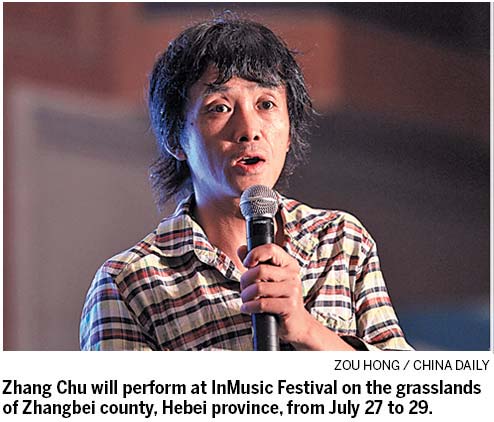|

A popular rock singer-songwriter in the 1990s, Zhang Chu has a new album. Chen Nan finds out more in Beijing.
After a 15-year hiatus, Zhang Chu has a new album. But he remains the shy guy that he is perceived to be.
"I don't know how to explain the new songs. I haven't even decided on the name of the album," says Zhang self-consciously.
The singer-songwriter says his friends, who have listened to the new album, told him that he sounded happier, more tolerant, less dark and less angry.
"They've told me that I've changed, that finally, I've grown up at the age of 44," he adds.
Tagged as the loneliest singer-songwriter in China, Zhang is also known as a man of few words. Onstage, Zhang always looks reticent and sings with his hands holding the microphone tightly.
He says he used to escape into his shell when he felt wronged, but is now courageous to face his fears -referring to the stress that comes with fame.
Although the interview was supposed to focus on his new album, Zhang seems more interested in reflecting on his challenging journey in the music industry.
He starts with his biggest folk-rock hit, Sister, in 1991, which was a peak year for the Chinese rock 'n' roll music scene.
"It was a year when rock songs were as popular as today's Jay Chou's songs, which are played on the streets and sung by many people," recalls Zhang.
Then, Zhang was hailed as one of the three pillars of record company Moyan, together with fellow rock singer-songwriters Dou Wei and He Yong. In 1994, the trio performed at the concert, China's Rock New Power, together with Beijing-based rock band, Tang Dynasty, at Hong Kong Coliseum, to an overwhelming audience.
"It was a touching moment. People cried, screamed and yelled," Zhang says. "He Yong even poured beer on a drummer's long hair to celebrate after the show."
The early 1990s was the pinnacle of his career. His albums - A Heart Cannot Fall (1993) and Shameful Being Alone (1994) - sold millions of copies in the mainland.
But fame was short-lived with the rise of Canto-pop music and commercialized music market.
"After that concert, actually even after the success of Sister, I wanted to quit," he says. "I didn't know how to react to the market changes."
He expressed his feelings in his album, Shameful of Being Alone, where he wrote: "This is 1994 and the air is full of the smell of money everyone seems to be standing in a flood of changes ..."
Zhang's songs revealed much about his thoughts on life and society, touching on loneliness and feeling lost, thus, earning him the nickname "the most lonesome singer-songwriter".
The songwriter attributes his introvert personality to his childhood, having to move from city to city because of his parents' jobs. He says the unstable situation made him reclusive and emotional.
After releasing Aeroplane Factory in 1997, Zhang left Beijing for his hometown, Xi'an, Shaanxi province.
"I felt safe in my own cave, no pressure from my record company and no stress dealing with fame. I was home," he says.
He later moved to the coastal city of Qingdao, Shandong province, living alone, which gave him the chance to start experimenting on music. He listened to all genres of music and read widely.
"I wanted to go back to the basics of writing music," he explains.
Zhang says his life has been about trying to realize dreams. He quit college to venture into rock music in Beijing, despite his parents' objections. After trying his hand at writing songs, he aspired to cut an album. "After realizing those dreams, what's next?" Zhang said that has been the question on his mind for years.
"Maybe it's due to age ... I've a different perspective about life and emotions. I express these in my new songs," he says. "People say rockers are all rebellious and angry all the time but I don't think so. When we sing about something, it's because we focus on that particular subject a lot. We want to turn something bad into something better."
He says returning to Beijing in 2008 has done him some good. He performed at a few outdoor music festivals, which built his confidence again.
"I feel so empowered onstage," says Zhang. "The energy from the crowds reminds me how important music is."
From July 27 to 29, he will perform at InMusic Festival on the grasslands of Zhangbei county, Hebei province, where audiences will get to hear his new songs for the first time.
"I am excited to hear his new songs. It's been years," says Ding Wu, the lead singer-songwriter of Tang Dynasty, who will also perform at InMusic Festival. "I remember the day when we performed in Hong Kong. It was chaotic yet full of zest. Zhang was like a kid, playing in his own world."
"The audiences who shared our music long ago were the same age as us. But now, both of us are in our 40s but many rock fans are in their 20s and 30s," Ding says. "We don't expect to regain our past glory, because the music world is different now. We count ourselves lucky to be singing still."
Contact the writer at chennan@chinadaily.com.cn. |